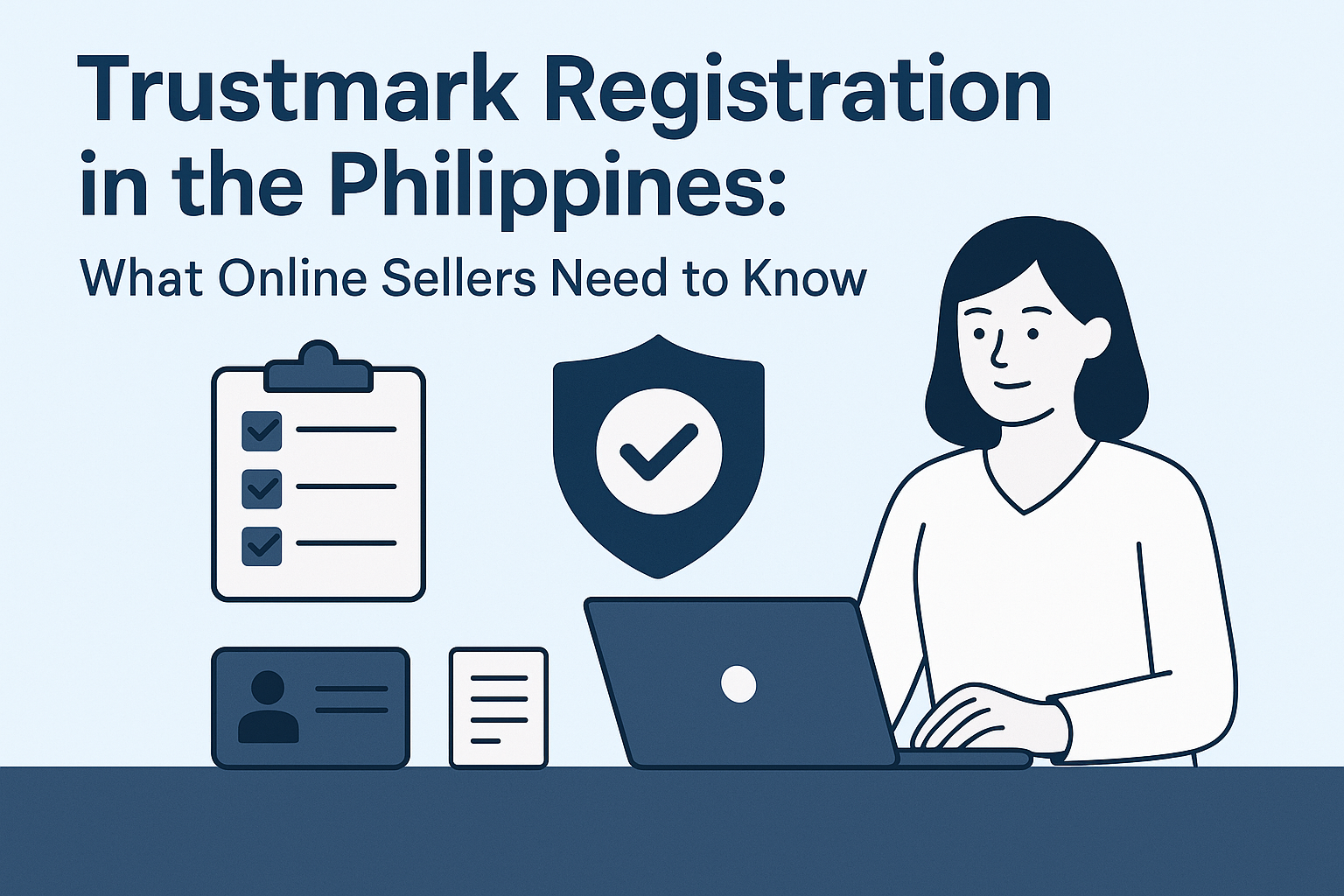Trustmark Registration in the Philippines: What Online Sellers and SMEs Need to Know
The Department of Trade and Industry (DTI) now requires many online businesses to register for the Philippine E-Commerce Trustmark under DAO No. 25-12 (2025). This guide explains—in plain business language—who must comply, what to prepare, fees, exemptions, deadlines, and how it affects day-to-day operations.
Why this order matters
Online commerce keeps growing, but so do buyer complaints and concerns about fake shops and unclear return policies. The Trustmark is a visible signal that a seller is legitimate, transparent, and responsive to customer issues. It aims to lift buyer confidence and level the playing field for compliant sellers. The requirement is anchored in the Internet Transactions Act of 2023 (RA 11967) and detailed by DTI’s DAO No. 25-12 (2025).[1][2]
What the rule means—in simple terms
The Trustmark is a digital badge issued by DTI’s E-Commerce Bureau. It’s not a business permit by itself; rather, it confirms your online shop follows good e-commerce practices—accurate product information, clear pricing, proper receipts, privacy and consumer redress policies. Once approved, you can display the badge on your site or store profile to reassure customers.[2]
Who must comply
- Online sellers offering products or services via websites, social pages, or live-selling.
- E-retailers operating their own online stores.
- Marketplaces and platforms that host or facilitate transactions (e.g., multi-seller apps/sites).
If you sell online for profit, you are within scope.[2]
Requirements (what to prepare)
- Business registration (DTI/SEC/CDA—depending on structure).
- BIR Certificate of Registration (Form 2303).
- Valid government ID of the owner or authorized representative.
- Regulatory permits if you sell regulated goods (e.g., food, cosmetics, electronics)—submit before offering such goods online.[3]
- Clear disclosures: business name, address, contact details, prices, shipping, returns/refunds.
- Internal redress mechanism: a documented way for customers to file complaints and get timely resolution.
Fees and discounts
DTI announced tiered fees to ease MSME compliance. The department has also clarified exemptions/discounts for smaller sellers.
| Business size (assets) | Application fee | Web admin fee | Doc stamp | Total |
|---|---|---|---|---|
| Micro (≤ ₱3,000,000) | ₱0 (exempt) | ₱100 | ₱30 | ₱130 |
| Small (> ₱3,000,000 to ₱15,000,000) | ₱500 (50% discount) | ₱100 | ₱30 | ₱630 |
| Medium & above (> ₱15,000,000) | ₱1,000 | ₱100 | ₱30 | ₱1,130 |
Fee schedule and MSME relief clarified by DTI and recent press reports.[4][5]
Exemptions and special treatment
- Micro enterprises are exempt from the application fee (you still pay minimal web admin and doc stamp).
- Small enterprises get a 50% discount on the application fee.
- BMBEs (Barangay Micro Business Enterprises) may qualify for favorable treatment consistent with MSME relief measures announced by DTI and local offices.[4]
Deadlines you should track
How this affects day-to-day operations
1) A bit more admin upfront
You’ll align registrations, IDs, and any special permits, and publish clear policies (pricing, shipping, returns). This is foundational for approval and future audits.
2) Customer trust and conversion
Displaying the Trustmark can improve shopper confidence, reduce cart abandonment, and support repeat purchases—especially for first-time buyers.
3) Platform expectations
Marketplaces may require compliance to keep selling. Non-compliance risks delisting and enforcement under RA 11967/DAO 25-12.
4) Ongoing upkeep
Keep disclosures current, renew permits as needed, and maintain a working redress process. Treat this like hygiene—similar to keeping BIR and business registrations up to date.
Key takeaways (quick summary)
- Trustmark = DTI-issued badge that signals compliant, trustworthy online selling.
- Who must register: online sellers, e-retailers, and marketplaces/platforms.
- What to prepare: DTI/SEC/CDA docs, BIR 2303, valid ID, permits for regulated goods, clear disclosures, redress mechanism.
- Fees: Micro ₱130 total (no app fee), Small ₱630, Medium+ ₱1,130.
- Deadline extended to Dec 31, 2025; apply at trustmark.dti.gov.ph.
- Operational impact: some admin work upfront, but better buyer trust and platform continuity.
Need help? Get guided compliance with less stress
We help SMEs and online sellers complete Trustmark registration end-to-end—documents review, policy templates (returns, refunds, complaint handling), and application filing—so you can focus on selling.
Includes a practical checklist and redress-mechanism template suitable for micro and small sellers.
Sources
- DTI – Internet Transactions Act of 2023 (RA 11967) overview. ecommerce.dti.gov.ph.
- DTI Department Administrative Order No. 25-12 (2025) – Certified true copy. DTI webfiles.
- Summary of DAO 25-12 compliance elements incl. permits for regulated goods. Aureada Law.
- DTI clarifies lower Trustmark fees for micro/small; extension to Dec 31, 2025; portal link. Daily Tribune.
- New DTI order details fee exemptions/discounts. Manila Bulletin.
- Deadline extension news. Newsbytes.ph.
- PNA/SunStar: extension to Dec 31, 2025. SunStar.
Always check the official portal for the latest specifics: trustmark.dti.gov.ph.


Leave a Reply